U.S., Qatar Sign Agreement on Fighting Terrorism
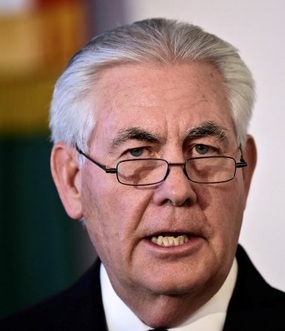
AFP
The U.S. and Qatar announced Tuesday they have signed an agreement on fighting terrorism, at a time when the emirate is facing sanctions from neighboring countries which accuse it of supporting extremism.
U.S. Secretary of State Rex Tillerson and Qatari Foreign Minister Sheikh Mohammed bin Abdulrahman Al-Thani made the announcement at a joint news conference in Doha.
Tillerson said the agreement was built on decisions made at a Riyadh summit in May to "wipe terrorism from the face of the Earth."
"As a result of President Trump's very strong call, these commitments for action, will begin immediately on a number of fronts."
Sheikh Mohammed said Qatar was the first country in the region to sign a bilateral agreement with Washington on counter terror funding and called on what he called the "siege" nations to follow suit and sign their own agreements with the U.S.
Tillerson's arrival in Doha was overshadowed by the publication of pre-existing confidential agreements between Qatar and other Gulf Cooperation Council (GCC) states in which all sides had pledged to combat terror funding and avoid interference in other states.
Publication of the accords, dated 2013 and 2014, caused both sides in the deadlocked dispute to launch a fresh round of mutual accusations over ties to Islamist extremist groups.
Tillerson arrived in Kuwait on Monday and will visit regional powerhouse, and longtime U.S. ally, Saudi Arabia before leaving the Gulf Thursday.
Kuwait has emerged as the main mediator in the conflict between Qatar and a group of Arab states, led by Saudi Arabia, over allegations Doha was too close to both Islamist extremists and Shiite Iran.
- 'No clean hands' -
While the U.S. State Department has warned the crisis could last months, Tillerson on Tuesday struck a moderately optimistic tone.
"I'm hopeful we can make some progress to bring this to a point of resolution," he said after meeting Qatari Emir Sheikh Tamim bin Hamad al-Thani in Doha.
"I think Qatar has been quite clear in its positions and I think very reasonable and we want to talk now... how do we take things forward, and that's my purpose in coming."
The current crisis is the worst to hit the Gulf since the establishment of the Gulf Cooperation Council in 1981.
Saudi Arabia, the United Arab Emirates, Bahrain and Egypt on June 5 announced sanctions, effective immediately, against Qatar over accusations Doha supported Islamist extremism and was too close to Iran.
The four states severed all diplomatic ties, suspended transport links with Doha and ordered all Qataris to return home within 14 days.
On June 22, the Saudi-led bloc issued a list of 13 demands which, if met, would end the sanctions, including closing broadcast giant Al-Jazeera, downgrading ties to Iran and shutting a Turkish military base in Doha.
Qatar refused to comply with the demands and has consistently denied accusations of ties to Islamist groups.
The U.S. has said the 13-point list was not an entirely viable option to end the crisis.
"Individually there are things in there that could work," said R.C. Hammond, a senior adviser to Tillerson.
"This is a two-way street," he said. "There are no clean hands."
- Riyadh agreements -
The publication of documents dubbed the Riyadh agreements on Monday appears to have renewed hostility between Qatar and its neighbors.
U.S. broadcaster CNN aired leaked papers in which Saudi Arabia, Qatar and Kuwait -- and later Bahrain and the UAE -- had signed accords forbidding support for any opposition and hostile groups in their own nations, as well as in Egypt and Yemen.
A joint statement released by the Saudi-led bloc boycotting Qatar confirmed the documents proved "beyond any doubt Qatar's failure to meet its commitments and its full violation of its pledges."
Doha, however, maintains that the boycott is in violation of the 2013 and 2014 agreements.
A statement from the Government Communications Office said the current "siege" was "a clear violation" of the GCC's charter and the Riyadh agreements.
- U.S. interests -
Tillerson's visit is the latest in a series by officials to the region, including U.N. diplomats and the foreign ministers of Germany, Britain and Oman.
The United States and its Western allies have vast economic and political interests in the Gulf, which pumps one fifth of the world's oil supplies, houses one third of proven global crude reserves and sits on one fifth of the world's natural gas deposits.
Tillerson is a former CEO of Exxon Mobil.
Qatar is also home to the U.S. military's largest air base in the region, al-Udeid. Rival Bahrain houses the U.S. Navy Fifth Fleet.
Analysts say Tillerson's impact on the crisis largely depends on his ability to maneuver regional skepticism over the extent to which he in fact represents the president of the United States.
President Donald Trump initially supported longtime American ally Saudi Arabia, but his stance was later contradicted when the U.S. Department of State took a more neutral position.
Tillerson's team has also adopted a more neutral stance against both sides in the conflict
Latest News
-
 US, Qatar, Turkey, Egypt meet in Miami to discuss Gaza truce on Friday
US, Qatar, Turkey, Egypt meet in Miami to discuss Gaza truce on Friday
-
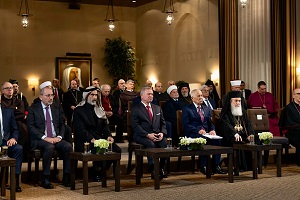 King receives Christian, Muslim religious leaders from Jerusalem, Jordan ahead of Christmas
King receives Christian, Muslim religious leaders from Jerusalem, Jordan ahead of Christmas
-
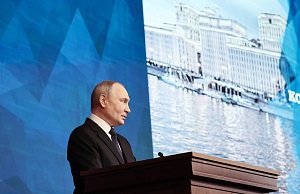 Putin says Russia will 'certainly' achieve its goals in Ukraine
Putin says Russia will 'certainly' achieve its goals in Ukraine
-
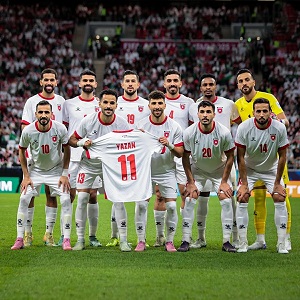 Sellami: Jordan target Arab Cup glory against ‘strong’ Moroccan side
Sellami: Jordan target Arab Cup glory against ‘strong’ Moroccan side
-
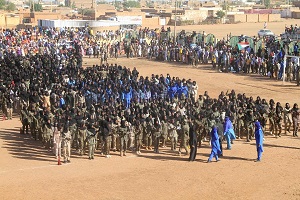 RSF destroying evidence of atrocities in Sudan - report
RSF destroying evidence of atrocities in Sudan - report